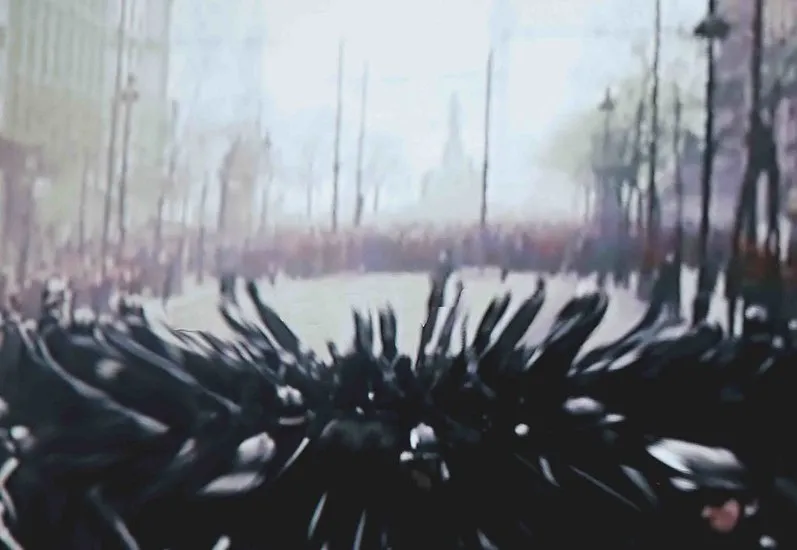 This article is part of the series — Tech in the New Decade.
This article is part of the series — Tech in the New Decade.
Even amidst lockdowns and danger of infection, the year of COVID-19 has seen conflicts, protests, and social and civil unrest all over the world. Unrest, in turn, creates favourable conditions for the exponential spread of disinformation because of two main reasons: Lack of knowledge, and aggressive information warfare conducted by all parties involved.
One of such zones of escalation was the post-Soviet space: Military activity in South Caucasus, long-lasting protests by the opposition in Belarus, and political instability and rapid change of power in Kyrgyzstan. Notably, clashes between Armenia and Azerbaijan in the autumn of 2020 actively continued online, with both sides providing contradictory news about the state of affairs on the frontlines. All in all, Armenians were deprived of the real picture of the war activities: The loss of Shusha city became known only after the official joint statement by the presidents of Azerbaijan, Armenia, and Russia. The on-ground situation and the result of the negotiations dropped on Armenian society like a bombshell, as prior to that, media narratives stated that the conquest of Shusha was just fake news created by Azerbaijani operatives.
Unrest, in turn, creates favourable conditions for the exponential spread of disinformation because of two main reasons: Lack of knowledge, and aggressive information warfare conducted by all parties involved.
Another example of confrontation deepened through information warfare is that of the clashes around the recent election of the Belarussian president. Both sides — pro-government and opposition forces — used social media platforms like Facebook and Telegram during the clashes. The speed of information flows in political crises now is so rapid that people do not have enough time for accurate analysis and assessment: They rush to take someone’s side so as not to stay on the sidelines of domestic politics.
Traditionally, wars were always followed by information warfare directed toward the enemy population, but modern technologies provide more tools for that purpose. Given that wars or internal collisions within states keep taking place in real time, we can only assess and control for how vulnerable societies are to the information they receive, and how actively information technologies are being used for vindication by adversaries.
If one wants to live in a prosperous and peaceful society, one should stand up for truth, free speech, and the opportunity to discuss and negotiate all conflicting issues.
Any civil confrontation within states is also followed by conflicting reports distributed by all actors involved. The strategy of drowning the enemy in mis/disinformation works as promptly as it does in inter-state conflicts, but if one wants to live in a prosperous and peaceful society one should stand up for truth, free speech, and the opportunity to discuss and negotiate all conflicting issues.
Governments or any political forces that use unverified information create trust issues for themselves. Misinformation, even if disseminated unintentionally, can be highly dangerous as it diverts society away from constructive conclusions and decisions. Mis/disinformation can also create an artificial enemy to distract people from other problems, or “artificial victories” in times of struggle.
Technologies are rapidly developing, and it means that falsification of ‘facts’ will become easier — be it historical facts or current events. Artificial intelligence can already imitate voices and soon one can create falsified video and audio of real people, even those who are deceased. What are the dystopian consequences of that? Just at first sight it is obvious that it can lead to escalation of conflicts, new tensions, disorientation of societies and governments, false accusations, and persecution of opponents.
Mis/disinformation can also create an artificial enemy to distract people from other problems, or “artificial victories” in times of struggle.
Hence, there is the high urgency for new international legislation which would prevent unfriendly actors from using contemporary technologies for psychological wars and suppression of so-called hostile societies through information violence.
At the same time, those who possess more resources and technologies for creating and disseminating disinformation will become more and more powerful. It concerns both — dimensions of war and diplomacy. Education on information security and hygiene must become a new obligatory school subject. To prevent these tragic developments, societies and governments must rediscover the significance of such values as transparency and accountability.
The views expressed above belong to the author(s). ORF research and analyses now available on Telegram! Click here to access our curated content — blogs, longforms and interviews.
 This article is part of the series — Tech in the New Decade.
This article is part of the series — Tech in the New Decade.
